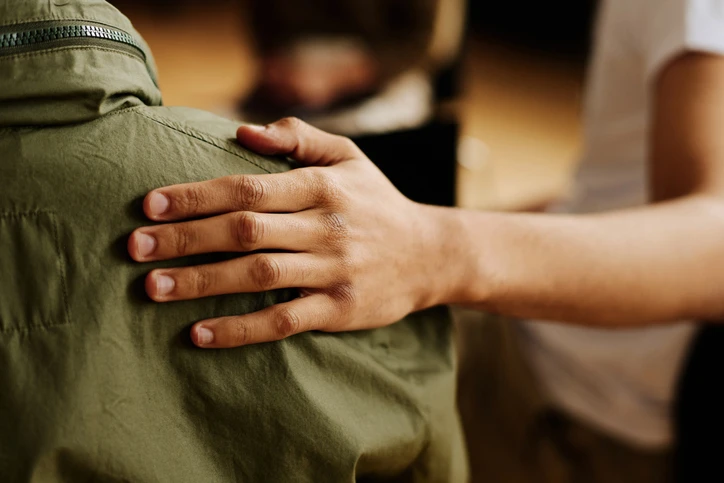Residential addiction treatment centers often incorporate the 12-Step approach into their services, recognizing the historical significance and community support it offers. According to the Substance Abuse and Mental Health Services Administration (SAMHSA), approximately 74% of substance abuse treatment facilities in the United States utilize the 12-Step model in their programs.
Programs like Alcoholics Anonymous (AA) and Narcotics Anonymous (NA) foster a sense of community and accountability as you transition from the structured environment of residential treatment back to independent living. Having a sponsor can help further enhance the benefits of the 12-Step approach.
The Role of a Sponsor in Recovery
A sponsor is a more experienced individual in recovery who volunteers to guide and support someone in the early stages of their path to sobriety. This relationship goes beyond the confines of group 12-Step meetings and provides a personalized, one-on-one connection that can be instrumental in helping promote a lasting recovery.
Here’s how a sponsor can help you in your recovery journey:
- Your sponsor will help you navigate the 12-Steps. While the 12-Step program provides a structured framework, a sponsor helps you figure out the best way to apply these principles to your life.
- Your sponsor can share the lessons they’ve learned. Every person’s recovery journey is unique, but your sponsor can share practical strategies for coping with cravings, stress, and life’s challenges based on their own experiences overcoming similar obstacles.
- Your sponsor can provide personalized guidance. A sponsor offers individualized support, helping you navigate the challenges specific to your journey. This personal touch can be particularly beneficial when you’re addressing underlying issues contributing to substance use, such as past trauma or struggles with chronic pain.
- Your sponsor can be a source of emotional support. Your sponsor has experienced the challenges of addiction and recovery themselves, allowing them to offer understanding and empathy when you’re struggling.
- Your sponsor can keep you motivated as you work towards your long-term recovery goals. A sponsor serves as an accountability partner, encouraging you to stay committed to your sobriety goals. Knowing that someone is invested in your success can be a powerful motivator during difficult times.
Although the benefits of having a sponsor are numerous, it’s important to remember that sponsorship is not a substitute for ongoing professional treatment—especially if you have a co-occurring mental health condition such as bipolar disorder. Sponsors are not licensed therapists or counselors. They can share their personal experiences and insights, but they are not trained to provide therapeutic interventions. For a lasting recovery, St. Joseph Institute will help you develop a continuing care plan that incorporates sponsorship as well as counseling or additional resources that can help you continue to build on the progress you made during residential treatment.
How to Find a 12-Step Sponsor
There is no formal process for finding a 12-Step sponsor, but keeping in mind the following tips can help you determine who would be a good fit:
- Ask for recommendations. Other members of your 12-Step group will often have insights into the strengths of different potential sponsors.
- Look for someone with at least one year of sobriety. While the length of sobriety doesn’t necessarily determine if someone would be a good sponsor, it’s important that your sponsor have a solid foundation for their own recovery journey.
- Seek similarities in background or experiences. Finding a sponsor who has gone through similar struggles or life experiences can be beneficial, as they may better understand your challenges. For example, if you’re concerned about how your substance use disorder has affected your children, you may relate best to a fellow parent. Or, if advancing in your career is very important to you, you may click with a sponsor who has thrived in a professional environment.
- Consider gender preferences. Traditionally, 12-Step groups have suggested that you choose a sponsor of the same gender. Men and women have different challenges in recovery, and choosing a person of the same gender can also reduce the risk of a romantic attachment that could put the progress you’ve made at risk.
- Ask questions. Before committing to a sponsor, ask questions about their approach to sponsorship, their availability, and their expectations. Clarify what kind of support they are willing to provide and how often you can check in with them to see if this meets your needs.
- Be open to change. It’s okay to reassess your sponsorship relationship over time. If you find that it’s not working for you, be open to finding a new sponsor who better aligns with your needs and goals.
St. Joseph Institute Is Here for You
Long-term sobriety is about more than just abstaining from the use of addictive substances. It’s about building a happy, healthy, and fulfilling life for yourself. At St. Joseph Institute, we encourage graduates of our Pennsylvania residential treatment center to view having a sponsor as an important part of their recovery journey. If you’d like to learn more about the services we offer, please contact our admissions representatives today.


